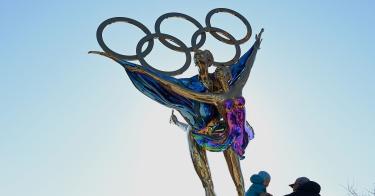The Biden administration has finally announced it will diplomatically boycott the 2022 Beijing Winter Olympics. A unilateral boycott was literally the least they could do. And coming, as it did, after long months of indecision, it looks more like a face-saving measure than moral leadership. It was the bare minimum.
That said, it's not over yet.
The diplomatic boycott was announced against a backdrop of Beijing’s ongoing genocide and crimes against humanity against its Uyghur minority. It also came on the heels of the Chinese Communist Party’s (CCP) targeting of former Olympian and tennis champion, Peng Shuai, who claimed on Chinese social media that she was raped by a senior CCP official. Not to mention the CCP’s undermining of freedom in Hong Kong and mishandling of the early days of the COVID-19 pandemic. The CCP’s egregious actions demand a strong response.
A diplomatic boycott ensures that U.S. government officials do not tacitly condone these activities, while still ensuring American athletes’ safe participation. But still more can be done to hold Beijing accountable during the Winter Games—and it doesn’t need to be done solely by the U.S. government:
>>> Peng Shuai: Yet Another Reason Beijing Shouldn’t Host the Winter Olympics
1. Multilateralize the diplomatic boycott. The U.S. is being mocked by Beijing because its diplomatic boycott is relatively isolated. It is imperative that Washington generate broad-based support. Creating a broad diplomatic coalition, even at this late date, will help show Beijing who is on the right side of history. On the other hand, going it alone, or nearly alone, will leave Washington with the diplomatic version of Carter’s 1980 Olympic boycott debacle.
2. American athletes can raise their voices in solidarity with the Chinese people. The Women’s Tennis Association (WTA), and many famous tennis players like Serena Williams have publicly called on the CCP to release Peng Shuai after she was held hostage by Beijing. The WTA’s actions stood in sharp contrast to the complicity of the International Olympic Committee, which sought to safeguard the Olympics at all costs.
American Olympians—and Olympians across the world—have an opportunity to speak out. Not only for Peng Shuai, but for all persecuted Chinese people. There are examples of this in Olympic history, from the American athlete who broke tradition by refusing to dip the U.S. flag before the host country’s dignitaries (which has become U.S. custom) at the opening ceremony of the 1908 Summer Olympics in London. Or other traditions, like the “black power” raised fists at the 1968 Summer Olympics in Mexico City. One can imagine the signal that could be sent by every national team refusing to dip its flag as it passes the box where China’s leaders are presiding.
3. Journalists should increase coverage of China’s abuses. Journalists who travel to China to cover the Olympics have a duty to speak up for the Chinese people whose rights are being violated by their own government. Coverage of atrocities in Xinjiang, human rights violations in Tibet and restrictions on freedom of speech, religion, and assembly should be front and center.
>>> Ideas Matter: The Fight Against the Ideology of the Chinese Regime
4. Businesses can pull sponsorship as a form of protest. The business community should weigh carefully any decisions to grant credence to the CCP’s propaganda during the Games and consider the reputational risks of doing so. At root, the Games are a money-making venture for the host. American companies who participate in The Olympic Partner Programme (TOP), like Coca Cola, Airbnb ABNB +1.4%, Visa, and Procter and Gamble PG -0.3%, can make the Olympics less profitable for the IOC and for Beijing by pulling their sponsorship of the Games. Olympic sponsors pay billions of dollars to the IOC to be associated with the Olympics brand. The TOP funding pays for the broadcasting operations of the host country, among other expenses. Furthermore, NBC should consider whether to air the Opening Ceremonies—which, if the 2008 Olympics were any indicator—ended up being a propaganda vehicle for the CCP. Businesses, including broadcasters, should not stand by as Beijing undermines human rights and security.
The administration missed an opportunity. It had become politically unfeasible for U.S. government representatives to attend the Olympic Games. By the time a decision was made, it was simply a recognition of reality. To make any difference at this point, the boycott must be followed up with an effort to make the CCP feel the heat from the international community in the lead-up to and during the Games.
This piece originally appeared in Forbes https://www.forbes.com/sites/oliviaenos/2021/12/08/four-ways-to-hold-beijing-accountable-during-the-winter-olympics/?sh=6d6c7f866d76



